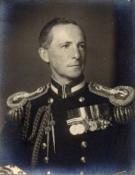
War Memorial
| Commander Cecil Burnaby PRICKETT RN La Croix de la Chevalier de la Republique Franc | |
|
HMS New Zealand, Royal Navy Date of birth: 4th December 1882 Date of death: 7th October 1972 Died aged 89 Unknown |

|
| Cecil Burnaby Prickett was born at 11, Melville Street, Edinburgh on the 4th of December 1882 the only son of Commander John Rolleston Prickett RN and Caroline Maria (nee Burnaby) Prickett. He was educated at Hazelwood School until December 1895. He was taught by a Naval Specialist from January to June 1896 to prepare for the entry exams for Britannia Naval College. He was due to take his entrance exam in June 1896 but was prevented from doing so by a medical board. As a result he went to a specialist naval school for the autumn term of that year to prepare and he entered the Naval College on the 15th of May 1897. He was appointed as a Midshipman in the Royal Navy on the 15th of November 1898. He saw service in the South African War on the cruiser HMS Powerful and on her sister ship, HMS Terrible, seeing action at Colenso. He then went on to China on board the gunboat HMS Partridge and saw service during the Boxer War. He was promoted to Sub Lieutenant on the 15th of April 1902 and to Lieutenant on the 30th of June 1904. He was appointed to the cruiser HMS Eclipse in 1908 for a gunnery course but illness prevented him from completing it. On the 9th of January 1909 he was appointed as a junior staff member at the shore base HMS Excellent. On the 1st of October he commanded a Guard of Honour of one hundred seamen during the launch of the dreadnought battleship HMS Neptune by the Duchess of Albany at the Royal Dockyard, Portsmouth. On the 14th of September 1911 he was married at His Majesty's Dockyard Church, Sydney, Australia to Gwladys (nee Kerr-Clark). The service was conducted by the Reverend G.W.F. Morgan, Chaplain to HMS Challenger and his best man was Lieutenant James Begg RN. They had three sons, Anthony John Cecil born on the 14th of September 1912, Nigel Robertson born in 1913 and David Christopher Marmaduke born in 1920. He was promoted to Lieutenant Commander on the 30th of June 1912. He was appointed as Gunnery Officer to the battlecruiser HMS New Zealand on June the 27th of June 1914 and was present at the action at Dogger Bank on the 24th of January 1915. He was present at the Battle of Jutland as Gunnery Officer on the battlecruiser HMS Princess Royal, part of the 1st Battle Cruiser Squadron, which had joined the fleet on the 15th of July 1916 after a refit and repair at Portsmouth. He was awarded La Croix de la Chevalier de la Republique Francaise on the 15th of September 1916 for his part in the battle also being mentioned in Sir John Jellicoe's despatches of the 15th of July 1916. For the same action he was awarded the Order of Saint Anne 3rd Class with swords by the Russian Government on the 5th of June 1917. He was recommended for promotion to Commander with the following citation as announced in the London Gazette of the 15th of September 1916:- "Cecil Burnaby Prickett. Gunnery officer of "Princess Royal." Controlled the fire of "Princess Royal" under very difficult conditions with conspicuous success. This is the third time he has controlled the fire of a battle-cruiser in action. A most efficient and resourceful officer. Strongly recommended." He was promoted to Commander on the 30th of June 1916 and was appointed as Gunnery Commander to the battlecruiser HMS Lion under Vice Admiral Pakenham. In September 1918 he served as a member of the Grand Fleet Dreyer Table Committee which investigated the best way of plotting range using a Dreyer Table Mark V. He was promoted to Captain on the 30th of June 1922. In 1925 he was selected by Rear Admiral W.A. Howard Kelly commander of the Second Cruiser Squadron, Atlantic Fleet as his Flag Captain and Chief Staff Officer on the light cruiser HMS Curacoa. On the 6th of May 1926 he was appointed as Chief Signal Officer, Aldershot Command. In 1928 he was appointed as Captain of the newly commissioned heavy cruiser HMS Norfolk and was commanding her in September 1931 during the Invergordon Mutiny where the sailors had refused to report for duty following a government imposed pay cut during the depression. He served as Naval Aide De Camp to the King until the 2nd of August 1934 and was promoted to Rear Admiral on the same day; he retired from the Navy the following day, the 3rd of August 1934. Following the outbreak of the Second World War he rejoined the service with the rank of Rear Admiral and was Flag Captain of the Reserve Fleet in 1945. In May 1940 he was living at Glastulluch House near Tain in Scotland and for a time he commanded A Company of the local Home Guard which consisted of seven platoons. When he died he was living at Loch Eye House, Fearn in Ross-shire. |
|
| Went on to Marlborough College |
Back